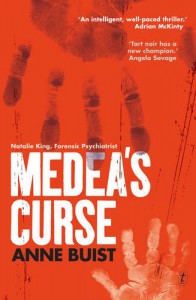A forensic psychiatrist in Australia. Mental health, abuse, death and professional boundaries.

Thanks to Net Galley and to Legend Press for providing me with a free copy of this book.
When I first read the description of the book, I thought this was the book for me. I do read in a variety of genres, I am a psychiatrist and I worked in forensic psychiatry (although in the UK, not in Australia like the protagonist) for a number of years. I also write and have a psychiatrist as one of my characters, so I was interested in this novel, not only as a reader but also as a writer.
As I read the novel I realised that perhaps I wasn’t the best person to give feedback on it, as although I enjoyed the descriptions and discussions of mental health matters that are one of the pillars of the book, I was not in a position to comment on how somebody who wasn’t familiar with the material, would find it (although from the comments I’ve read, it seems people enjoy it and don’t find it difficult or too detailed).
The novel is told in the third person from the point of view of Nicole, a young female psychiatrist who works in a forensic setting, both in a hospital and also sees outpatients in her own practice. She only works with female patients, and has her own mental health problems (she is bipolar, and regularly sees a therapist, currently only for supervision, Declan, who functions as the voice of reason, although unfortunately he isn’t always given the full information). Nicole identifies herself closely with some of her patients and finds it difficult not to get over-involved (after all, she was also an impatient, and had a difficult childhood, like many of the women she works with). That causes quite a few of the complex situations she sees herself in, although perhaps also makes her get ‘results’, albeit at a high personal cost.
Nicole is not a model of professionality or a model patient either. Sometimes she doesn’t take her medication, she mixes it with alcohol, and she struggles with issues of confidentiality. She does not get on well with the Professor who is the star psychiatrist in the department where she works, and she has her own morality that might clash with accepted standards(she does not want long-term romantic relationships, but sex with a married man, even one she knows due to work, is OK). She is also not the wisest and tries to convince herself that she is not scared and does not need anybody when she gets evidence that she’s being stalked. And if you think of psychiatrist as bookish and boring, Nicole is none of that. She plays in a band, rides a big motorbike and favours leather gear.
A couple of warnings: there is sex in the novel, although not explicit and too descriptive, but if you don’t like sexual language, there is some. From the point of view of the plot, it helps demonstrate that Nicole’s impulsivity spreads to many areas of her life, illustrates her high mood at one point, and at the end, it helps us get a better picture of what her true priorities are. The second warning is about the main subject of the book. The author works in postnatal mental health, and the patients Nicole works with and the cases being investigated pertain to infanticides or child murders, and also to paedophilia and sexual abuse, and although not gory, the psychological descriptions ring true and might be difficult to read if you are especially sensitive to those themes. It is not a light or feel-good book, that’s a fact.
The different women Nicole works with and their different families, mirror one another and at times it might be difficult to extricate the smaller characters and differentiate between them even if you’re playing close attention, but the main characters’ psychological makeup rings true, and there are masterful descriptions of symptoms of mental illness, like those Nicole experiences when she’s going high. I could also identify professionally with the issues Nicole has with the difficult interface between being a psychiatrist to her patients, and also having to take into account that they are (or might be) criminals and might represent a risk to others. She struggles with issues of confidentiality and risk, and that is one of the true complexities of forensic psychiatry.
The plot is complex and twists and turns, making the reader share with the protagonist in her doubts about diagnosis, guilty parties, about her stalker, and even about her personal relationships.
I recommend it to readers with a particular interest in mental health and psychological thrillers, who are not unduly concerned about sex or child abuse and murder in their books, and who enjoy complex characterisations and plots.







